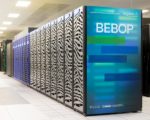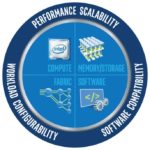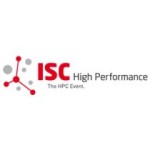Speculation abounds about Pat Gelsinger’s first public appearance as CEO of Intel at a webinar (5 pm Eastern Time) today that will capture close attention from a host of the company’s core audiences: customers, business partners, employees, industry and financial analysts – and the HPC community. The webinar, confidently called “Intel Unleashed: Engineering the Future,” […]
Intel Achieves AWS High Performance Computing Competency Status
Intel has announced it has achieved Amazon Web Services (AWS) High Performance Computing (HPC) Competency status. This designation recognizes that Intel has demonstrated deep experience helping customers optimize their HPC workloads for performance and efficiency using AWS’s elastic and scalable cloud infrastructure. “HPC has been key to solving the most complex problems in every industry and […]
Getting to Exascale: Nothing Is Easy
In the weeks leading to today’s Exascale Day observance, we set ourselves the task of asking supercomputing experts about the unique challenges, the particularly vexing problems, of building a computer capable of 10,000,000,000,000,000,000 calculations per second. Readers of this publication might guess, given Intel’s trouble producing the 7nm “Ponte Vecchio” GPU for its delayed Aurora system for Argonne National Laboratory, that compute is the toughest exascale nut to crack. But according to the people we interviewed, the difficulties of engineering exascale-class supercomputing run the systems gamut. As we listened to exascale’s daunting litany of technology difficulties….
Veteran Argonne System Helps Find Method to Convert CO2 into Ethanol
By supercomputing standards, Argonne National Lab’s Bebop (stood up in 2017, 1.75 teraflops, bumped off the Top500 list after the June 2019 ranking) seems something of a second-tier player. But veteran, formerly non-Top500 systems like Bebop can still take a star turn, as shown by the results of a research team from Northern Illinois University […]
Argonne Claims Largest Engine Flow Simulation Using Theta Supercomputer
Scientists at the U.S. Department of Energy’s (DOE) Argonne National Laboratory have conducted what they claim is the largest simulation of flow inside an internal combustion engine. Insights gained from the simulation – run on 51,328 cores of Argonne’s Theta supercomputer – could help auto manufacturers to design greener engines. A blog post on the […]
Lenovo Standing Up Liquid-cooled Neptune System at Max Planck Society
Lenovo is installing a Neptune liquid cooled supercomputer at the Max Planck Society, a delivery that began two months ago and is scheduled to be completed early next year. The €20 million project includes a 100,000-core Neptune comprised of Lenovo ThinkSystem servers with Intel CPUs (unspecified) and Nvidia Tesla A100 GPUs, software and operational support, […]
The Hyperion-insideHPC Interviews: Rich Brueckner and Mike Bernhardt Talk Exascale and HPC Marketing: How the HPC Community Tells its Story to the World
After more than three decades in supercomputing as a strategic marketing and communications executive, Mike Bernhardt has seen the HPC community evolve through the many phases of its existence. A “Perennial” (see below) at the annual SC industry conference, Bernhardt remains fascinated by the connection between leading-edge computation and scientific discovery. “In many ways, it’s […]
SeRC Turns to oneAPI Multi-Chip Programming Model for Accelerated Research
At ISC 2020 Digital, the Swedish e-Science Research Center (SeRC), Stockholm, has announced plans to use Intel’s oneAPI unified programming language by researchers conducting massive simulations powered by CPUs and GPUs. The center said it chose the oneAPI programming model, designed to span CPUs, GPUs, FPGAs and other architectures and silicon, to accelerate compute for research using GROMACS (GROningen MAchine for Chemical Simulations) molecular dynamics software, developed by SeRC and first released in 1991
New Intel Technologies Highlighted in SC16 Announcements
Here’s a recap of SC16 announcements from Intel that are designed to provide even more powerful capabilities to address HPC challenges like energy efficiency, system complexity, and the ability for simplified workload customization. In supercomputing, one size certainly does not fit all. Intel’s new and updated technologies take a step forward in addressing these issues, allowing users to focus more on their applications for HPC, not the technology behind it.
See What’s New from Intel at ISC 2016
New HPC products and technologies. Compelling demos. Insights from top Intel HPC architects. More than 60 presentations from Intel and industry experts. Additional details about Intel® Scalable System Framework. Intel will have something for everyone at this year’s International Supercomputing Conference in Frankfurt, Germany.











